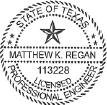Reliance Marcellus, LLC Acquisition
January 22, 2021
Page 3
Economic Parameters
Ownership was accepted as furnished and has not been independently confirmed. Gas price differentials, ad valorem taxes, severance taxes and lease operating expenses were calculated and prepared by NOG and were reviewed by us for accuracy and completeness. Lease operating expenses were estimated from historical lease operating statements. Lease operating expenses and investments were not escalated.
Reserve Estimation Methods
As you explained, reserves for proved developed producing wells were estimated using production performance methods for the vast majority of properties. Certain new producing properties with very little production history were forecast using a combination of production performance and analogy to offset production, both of which are considered to provide a relatively high degree of accuracy.
Non-producing reserve estimates, were forecast using either volumetric or analogy methods, or a combination of both and are presented unrisked. These methods provide a relatively high degree of accuracy for predicting undeveloped reserves for these properties, due to the mature nature of their properties targeted for development and an abundance of subsurface control data. The assumptions, data, methods and procedures used herein are appropriate for the purpose served by this letter.
Audit Opinion
In our opinion, the Company’s estimates of future reserves for the audited properties were prepared in accordance with generally accepted petroleum engineering and evaluation principles for the estimation of future reserves as set forth in the Society of Petroleum Engineers’ Standards Pertaining to the Estimating and Auditing of Oil and Gas Reserves Information. Furthermore, we found no bias in the utilization and analysis of data in estimates for these properties.
In our opinion, the overall proved reserves and future net cash flows as estimated by the Company based on the SEC pricing scenario are, in the aggregate, reasonable within the established audit tolerance guidelines of (+ or -) 10 percent as set forth in the Standards Pertaining to the Estimating and Auditing of Oil and Gas Reserve Information promulgated by the Society of Petroleum Engineers.
It should be understood that our audit does not constitute a complete reserve study of the gas properties. In the conduct of our audit, we have not independently verified the accuracy and completeness of information and data furnished with respect to ownership interests, gas production, costs and timing of development and agreements relating to current and future operations and sales of production. Furthermore, if in the course of our examination something came to our attention which brought into question the validity or sufficiency of any of such information, we did not rely on such information until we had properly resolved our questions or independently verified such information.
General Discussion
The estimates and forecasts were based upon interpretations of data furnished by your office and available from our files. To some extent information from public records has been used to check and/or supplement these data. The basic engineering and geological data were subject to third party reservations and qualifications. Nothing has come to our attention, however, that would cause us to believe that we are not justified in relying on such data. All estimates represent our best judgment based on the data available at the time of preparation. Due to inherent uncertainties in future production rates, commodity prices and geologic conditions, it should be realized that the reserve estimates, the reserves actually recovered, the revenue derived therefrom and the actual cost incurred could be more or less than the estimated amounts.
The reserve classifications and the economic considerations applied herein for the SEC pricing scenario conform to the criteria set forth by the SEC. The reserves and economics are predicated on regulatory agency classifications, rules, policies, laws, taxes and royalties currently in effect except as noted herein. The possible effects of changes in legislation or other Federal or State restrictive actions which could affect the reserves and economics have not been considered. However, we do not anticipate nor are we aware of any legislative changes or restrictive regulatory actions that may impact the recovery of reserves.
